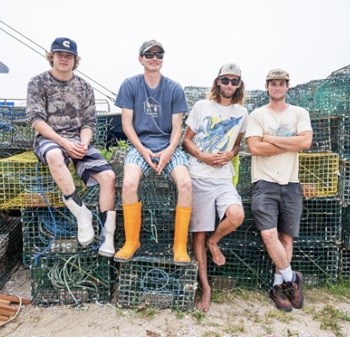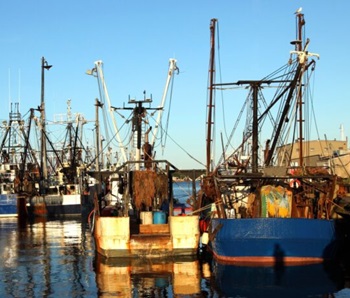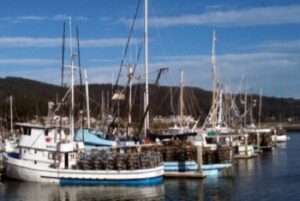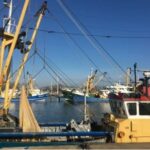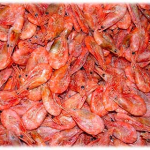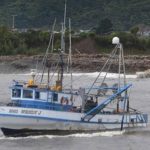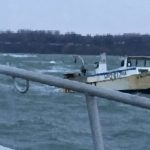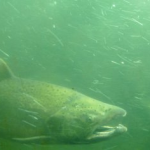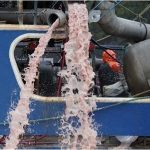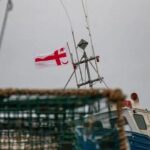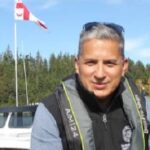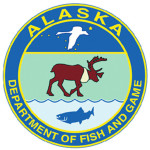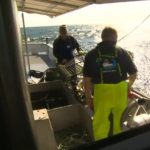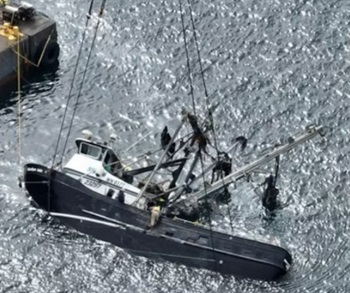 Washington state officials are ordering a salmon fisherman to pay $646,259 in damages and penalties for spilling diesel fuel into Haro Strait as his commercial fishing boat sank off San Juan Island. The boat, a purse seiner called F/V Aleutian Isle, sank while participating in a sockeye salmon fishery in August 2022. Its five-member crew escaped onto a small skiff before the Aleutian Isle rolled on its side and disappeared beneath the waves, about 15 minutes after its captain noticed water covering its main deck. F/V Aleutian Isle spent more than a month on the sea floor, with the powerful currents of Haro Strait moving it to deeper water over time, before salvage crews lifted it from the water. They recovered 590 gallons of diesel from its tanks. Photos, more, >>CLICK TO READ<< 09:11
Washington state officials are ordering a salmon fisherman to pay $646,259 in damages and penalties for spilling diesel fuel into Haro Strait as his commercial fishing boat sank off San Juan Island. The boat, a purse seiner called F/V Aleutian Isle, sank while participating in a sockeye salmon fishery in August 2022. Its five-member crew escaped onto a small skiff before the Aleutian Isle rolled on its side and disappeared beneath the waves, about 15 minutes after its captain noticed water covering its main deck. F/V Aleutian Isle spent more than a month on the sea floor, with the powerful currents of Haro Strait moving it to deeper water over time, before salvage crews lifted it from the water. They recovered 590 gallons of diesel from its tanks. Photos, more, >>CLICK TO READ<< 09:11
Monthly Archives: June 2024

An Optimist’s view: Death of the Chevron Deference
My name is David Goethel. I am a 55 year plus commercial fisherman, research biologist and former fishery manager. As author of Endangered Species/Chronicles of A new England Fisherman I discuss these topics and a lawsuit I filed in 2015 with the legal group Cause of Action over the legal concept known as Chevron Deference. Most people believe Congress writes laws, the Executive Branch carries out those laws and the Judicial Branch interprets and clarifies whether aspects of those laws are Constitutional and correctly applied. It turns out under a doctrine called “Chevron Deference” the regulatory bureaucracy can deem a law unclear or ambiguous and create any regulation the agency decides it needs to carry out its bureaucratic function. Until this past Friday, the courts gave deference to the regulators as the “recognized experts” even though no proof is required and no test for ambiguity is applied. The Supreme Court overturned Chevron Friday saying they had “placed a tombstone on its grave”. Fishermen, including me, had sued saying that unelected regulators should not have this vast power over our lives. more, >>CLICK TO READ<< 20:18
Fire destroys 5 fishing boats in Magdalen Islands, Quebec.
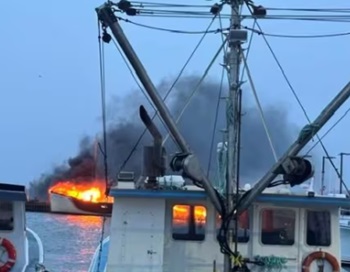 Five fishing boats were completely destroyed in a fire at the Magdalen Islands’ Grande-Entrée wharf Sunday morning. The fire department received a call around 4:20 a.m. about burning boats at the Magdalen Islands’ largest fishermen wharf. The fires were under control as of 7:30 a.m., though three boats sank, two others were burned to a crisp and others suffered minor damage, said Antonin Valiquette, the mayor of the Magdalen Islands. No one was injured. Valiquette says all evidence points to the fire being accidental. It appears to have started in one boat and been pushed onto other boats by the wind. more, >>CLICK TO READ<< 13:23
Five fishing boats were completely destroyed in a fire at the Magdalen Islands’ Grande-Entrée wharf Sunday morning. The fire department received a call around 4:20 a.m. about burning boats at the Magdalen Islands’ largest fishermen wharf. The fires were under control as of 7:30 a.m., though three boats sank, two others were burned to a crisp and others suffered minor damage, said Antonin Valiquette, the mayor of the Magdalen Islands. No one was injured. Valiquette says all evidence points to the fire being accidental. It appears to have started in one boat and been pushed onto other boats by the wind. more, >>CLICK TO READ<< 13:23
Fishermen Who Were Forced to Pay $700 Per Day to Government-Mandated Observers on Their Boats Get Big News from SCOTUS
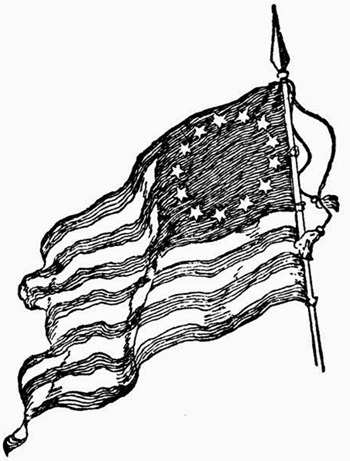 Members of the 18th-century British Parliament, unelected by American colonists, tried to take money from those colonists without their consent. Hence, the American Revolution ensued. On Friday, the U.S. Supreme Court overturned a 40-year-old ruling that had allowed unelected federal regulators, acting the part of the British Parliament, to commit such travesties of justice as requiring fishermen to pay for government-mandated regulators on their boats — a requirement that, according to CBS, could cost the fishermen more than $700 per day. The true magnitude of Friday’s ruling, however, involved far more than fishing boats. In fact, it struck at the heart of American progressivism by eviscerating the insidious claim that federal “experts” know best. In so doing, it took one small-but-crucial step towards dismantling the permanent federal state that actually governs in Washington, D.C. more, >>CLICK TO READ<< 11:18
Members of the 18th-century British Parliament, unelected by American colonists, tried to take money from those colonists without their consent. Hence, the American Revolution ensued. On Friday, the U.S. Supreme Court overturned a 40-year-old ruling that had allowed unelected federal regulators, acting the part of the British Parliament, to commit such travesties of justice as requiring fishermen to pay for government-mandated regulators on their boats — a requirement that, according to CBS, could cost the fishermen more than $700 per day. The true magnitude of Friday’s ruling, however, involved far more than fishing boats. In fact, it struck at the heart of American progressivism by eviscerating the insidious claim that federal “experts” know best. In so doing, it took one small-but-crucial step towards dismantling the permanent federal state that actually governs in Washington, D.C. more, >>CLICK TO READ<< 11:18
Louisiana Inshore Shrimp Season to Close July 1 in State Inside Waters
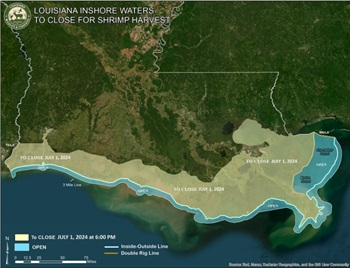 The Louisiana Department of Wildlife and Fisheries announced the 2024 spring inshore shrimp season will close at 6 p.m. on Monday, July 1, 2024, in all state inside waters from the Mississippi/Louisiana state line westward to the Louisiana/Texas state line. The open waters of Breton and Chandeleur Sounds as bounded by the double-rig line described in R.S. 56:495.1(A)2 and all state outside waters seaward of the Inside/Outside Shrimp Line, as described in LAC 76:VII.370 will remain open to shrimping until further notice. more>>CLICK TO READ<< 09:07
The Louisiana Department of Wildlife and Fisheries announced the 2024 spring inshore shrimp season will close at 6 p.m. on Monday, July 1, 2024, in all state inside waters from the Mississippi/Louisiana state line westward to the Louisiana/Texas state line. The open waters of Breton and Chandeleur Sounds as bounded by the double-rig line described in R.S. 56:495.1(A)2 and all state outside waters seaward of the Inside/Outside Shrimp Line, as described in LAC 76:VII.370 will remain open to shrimping until further notice. more>>CLICK TO READ<< 09:07
Concerns about overfishing resurface despite new monument off Cape Cod
 Located 130 miles off Cape Cod, the area spans more than 3 million acres and is part of the Biden Administration’s plan to conserve at least 30 percent of U.S. lands and waters by 2030. Officially called the Northeast Canyons and Seamounts Marine National Monument. Debate over how to manage this vast marine environment has been ongoing. Former President Donald Trump lifted restrictions on commercial fishing in the monument area in 2020. The Biden administration reestablished protections one year later, in a move praised by environmental groups and condemned by fishermen, who said it would put more people out of work. more, >>CLICK TO READ<< 07:30
Located 130 miles off Cape Cod, the area spans more than 3 million acres and is part of the Biden Administration’s plan to conserve at least 30 percent of U.S. lands and waters by 2030. Officially called the Northeast Canyons and Seamounts Marine National Monument. Debate over how to manage this vast marine environment has been ongoing. Former President Donald Trump lifted restrictions on commercial fishing in the monument area in 2020. The Biden administration reestablished protections one year later, in a move praised by environmental groups and condemned by fishermen, who said it would put more people out of work. more, >>CLICK TO READ<< 07:30
Gliders: Scientists add more underwater robots to monitor North Atlantic right whales
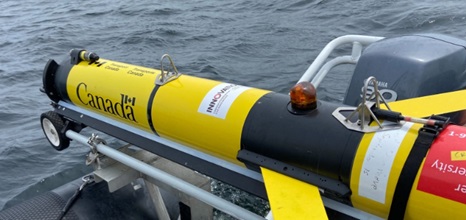 In the race to protect the endangered species, researchers are bringing in more underwater robots—unmanned vehicles known as gliders that slowly patrol the Gulf of St. Lawrence, passively listening for whales. Gliders can stay at sea for months, move far offshore and work in all types of weather. They’re equipped with underwater microphones that scientists use to track the animals. The team added a third glider to its fleet this summer, expanding its ability to monitor whales’ whereabouts by sea and air. It’s collaborative effort involving researchers from University of New Brunswick, Ocean Tracking Network, Transport Canada and Woods Hole Oceanographic. more, >>CLICK TO READ<< 19:37
In the race to protect the endangered species, researchers are bringing in more underwater robots—unmanned vehicles known as gliders that slowly patrol the Gulf of St. Lawrence, passively listening for whales. Gliders can stay at sea for months, move far offshore and work in all types of weather. They’re equipped with underwater microphones that scientists use to track the animals. The team added a third glider to its fleet this summer, expanding its ability to monitor whales’ whereabouts by sea and air. It’s collaborative effort involving researchers from University of New Brunswick, Ocean Tracking Network, Transport Canada and Woods Hole Oceanographic. more, >>CLICK TO READ<< 19:37
Virginia Moves To End 16-Year Ban On Dredging For Crabs During Winter
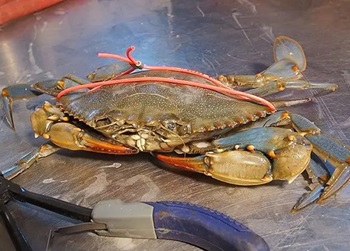 Virginia’s fishery managers have lifted the longstanding ban on dredging for blue crabs during the winter in the Chesapeake Bay, a seismic policy shift that drew strong criticism from their Maryland counterparts and conservationists. The Virginia Marine Resources Commission voted 5–4 on June 25 to repeal the 16-year prohibition on winter dredging. The board is expected to reconvene in September to consider staff recommendations on how to implement the fishery. The new season could open as early as this December. The board’s action came after the VMRC’s Crab Management Advisory Committee, which is mostly made up of industry members, voted 10–2 in favor of reopening the winter season. After that May 29 vote, the agency received 186 public comments on the proposal — all in opposition. more, >>CLICK TO READ<< 16:12
Virginia’s fishery managers have lifted the longstanding ban on dredging for blue crabs during the winter in the Chesapeake Bay, a seismic policy shift that drew strong criticism from their Maryland counterparts and conservationists. The Virginia Marine Resources Commission voted 5–4 on June 25 to repeal the 16-year prohibition on winter dredging. The board is expected to reconvene in September to consider staff recommendations on how to implement the fishery. The new season could open as early as this December. The board’s action came after the VMRC’s Crab Management Advisory Committee, which is mostly made up of industry members, voted 10–2 in favor of reopening the winter season. After that May 29 vote, the agency received 186 public comments on the proposal — all in opposition. more, >>CLICK TO READ<< 16:12
Opinion: The Fisheries Act is crucial to speed disaster relief to American fisheries
 By the time NOAA and OMB finally approve and allocate disaster relief, small businesses and fisheries are already devastated and, in some cases, may have already been forced to close shop. This self-induced, slow-moving bureaucratic process is unacceptable. Overall, the Fishes Act expedites the deployment of federal fishery disaster relief by cutting unnecessary red tape and enacting a 30-day decision requirement for the Office of Management and Budget to either deny or approve a state’s spending plan. What we hope to do with this bill is to throw American fisheries and coastal communities a life raft to stay afloat post-disaster. U.S. fisheries support millions of jobs and bring in billions of dollars to the broader U.S. economy each year. more, >>CLICK TO READ<< 10:17
By the time NOAA and OMB finally approve and allocate disaster relief, small businesses and fisheries are already devastated and, in some cases, may have already been forced to close shop. This self-induced, slow-moving bureaucratic process is unacceptable. Overall, the Fishes Act expedites the deployment of federal fishery disaster relief by cutting unnecessary red tape and enacting a 30-day decision requirement for the Office of Management and Budget to either deny or approve a state’s spending plan. What we hope to do with this bill is to throw American fisheries and coastal communities a life raft to stay afloat post-disaster. U.S. fisheries support millions of jobs and bring in billions of dollars to the broader U.S. economy each year. more, >>CLICK TO READ<< 10:17
How a seagoing mentorship program trains ‘greenhorns’ and changes lives
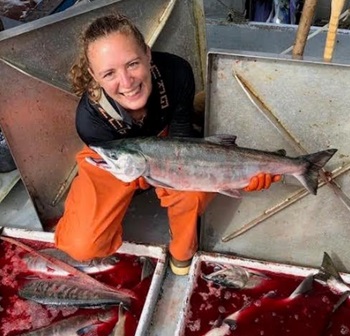 As a student at Vermont’s Middlebury College, Lea LeGardeur loved being on the water. Which proved an asset for LeGardeur, who, after teaching geography at Middlebury, decided to commercial fish in Alaska. LeGardeur’s break came when she discovered the Alaska Longline Fishermen’s Association, or ALFA, based in the small fishing town of Sitka, Alaska. The organization had an extensive record of fighting foreign fishing, trawling and depletion of resources. ALFA had recently secured a grant to fund its Crew Training Program, or CTP. The program was the brainchild of Karl Jordan, who suggested the concept to his father, Eric, shortly after Eric’s wife, Sarah, announced her decision to retire from fishing. Jordan père went on to propose the concept to Linda Behnken, the executive director at ALFA. Photos, Video, more, >>CLICK TO READ<< 07:50
As a student at Vermont’s Middlebury College, Lea LeGardeur loved being on the water. Which proved an asset for LeGardeur, who, after teaching geography at Middlebury, decided to commercial fish in Alaska. LeGardeur’s break came when she discovered the Alaska Longline Fishermen’s Association, or ALFA, based in the small fishing town of Sitka, Alaska. The organization had an extensive record of fighting foreign fishing, trawling and depletion of resources. ALFA had recently secured a grant to fund its Crew Training Program, or CTP. The program was the brainchild of Karl Jordan, who suggested the concept to his father, Eric, shortly after Eric’s wife, Sarah, announced her decision to retire from fishing. Jordan père went on to propose the concept to Linda Behnken, the executive director at ALFA. Photos, Video, more, >>CLICK TO READ<< 07:50
DFO warns Canadian fishers about participating in French halibut fishery
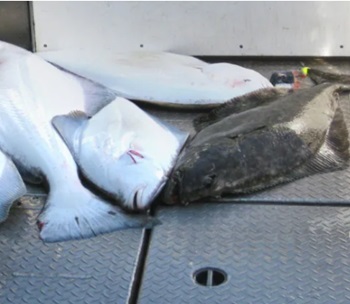 On Friday, Fisheries and Oceans Canada issued a statement saying it has requested formal consultations under the Proces-Verbal to reach an agreement related to quota allocation. The government describes Proces-Verbal as “a treaty that has allowed Canada and France/Saint Pierre and Miquelon to cooperate on the management of fish stocks that are present in our two domestic fishing waters.” The move follows word that a French-flagged ship recently landed 30 tonnes of halibut in Saint Pierre and Miquelon that is believed to be destined for the United States via the Port of Halifax. The fish was caught outside Canada’s 200-mile limit off Newfoundland and Labrador in an area known as the Northwest Atlantic Fisheries Organization Regulatory Area, according to industry sources. more, >>CLICK TO READ<< 06:46
On Friday, Fisheries and Oceans Canada issued a statement saying it has requested formal consultations under the Proces-Verbal to reach an agreement related to quota allocation. The government describes Proces-Verbal as “a treaty that has allowed Canada and France/Saint Pierre and Miquelon to cooperate on the management of fish stocks that are present in our two domestic fishing waters.” The move follows word that a French-flagged ship recently landed 30 tonnes of halibut in Saint Pierre and Miquelon that is believed to be destined for the United States via the Port of Halifax. The fish was caught outside Canada’s 200-mile limit off Newfoundland and Labrador in an area known as the Northwest Atlantic Fisheries Organization Regulatory Area, according to industry sources. more, >>CLICK TO READ<< 06:46
Neil Gorsuch Cheers Supreme Court Placing ‘Tombstone’ on 40-Year Precedent
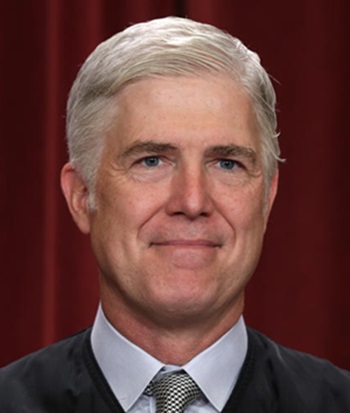 In Friday’s 6-3 ruling in Loper Bright Enterprises v. Raimondo, the justices wiped out 40 years of administrative law precedent in a move that will restrain federal agency powers. The court’s decision overturned the Chevron deference established in the 1984 case Chevron v. Natural Resources Defense Council. The majority, led by Chief Justice John Roberts and joined by the court’s other conservative justices, held that “courts may not defer to an agency interpretation of the law simply because a statute is ambiguous,” overturning Chevon deference. The court’s three liberal justices dissented. The majority, led by Chief Justice John Roberts and joined by the court’s other conservative justices, held that “courts may not defer to an agency interpretation of the law simply because a statute is ambiguous,” overturning Chevon deference. The court’s three liberal justices dissented. In Gorsuch’s concurring opinion, he wrote: “Today, the Court places a tombstone on Chevron no one can miss. In doing so, the Court returns judges to interpretive rules that have guided federal courts since the Nation’s founding.” more, >>CLICK TO READ<< 15:49
In Friday’s 6-3 ruling in Loper Bright Enterprises v. Raimondo, the justices wiped out 40 years of administrative law precedent in a move that will restrain federal agency powers. The court’s decision overturned the Chevron deference established in the 1984 case Chevron v. Natural Resources Defense Council. The majority, led by Chief Justice John Roberts and joined by the court’s other conservative justices, held that “courts may not defer to an agency interpretation of the law simply because a statute is ambiguous,” overturning Chevon deference. The court’s three liberal justices dissented. The majority, led by Chief Justice John Roberts and joined by the court’s other conservative justices, held that “courts may not defer to an agency interpretation of the law simply because a statute is ambiguous,” overturning Chevon deference. The court’s three liberal justices dissented. In Gorsuch’s concurring opinion, he wrote: “Today, the Court places a tombstone on Chevron no one can miss. In doing so, the Court returns judges to interpretive rules that have guided federal courts since the Nation’s founding.” more, >>CLICK TO READ<< 15:49
Biloxi Blessing of the Fleet: A Coast tradition
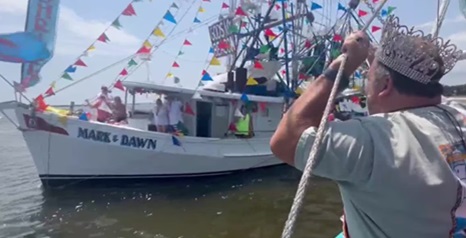 It’s time for Biloxi’s Blessing of the Fleet, a yearly Coast tradition that dates back to 1929. This year, it’s happening Sunday, July 7. Each year before shrimp boats journey into the Gulf, they are blessed in the waters between East Biloxi and Deer Island. The ceremonial blessing, given by a local Catholic priest, marks the official beginning of shrimping season. During the event, an evergreen wreath is dropped into the Sound in the memory of those shrimpers who have died at sea. The event once only blessed working boats, but now recreational boats are welcome to be blessed, as well. more, >>CLICK TO READ<< 12:29
It’s time for Biloxi’s Blessing of the Fleet, a yearly Coast tradition that dates back to 1929. This year, it’s happening Sunday, July 7. Each year before shrimp boats journey into the Gulf, they are blessed in the waters between East Biloxi and Deer Island. The ceremonial blessing, given by a local Catholic priest, marks the official beginning of shrimping season. During the event, an evergreen wreath is dropped into the Sound in the memory of those shrimpers who have died at sea. The event once only blessed working boats, but now recreational boats are welcome to be blessed, as well. more, >>CLICK TO READ<< 12:29

Supreme Court Strips Power from Federal Agencies—Overturning Decades-Old Precedent
The Supreme Court overturned a landmark ruling Friday that gave widespread power to federal agencies, a seismic ruling that has the power to upend how the federal government operates—and delivers a win to conservative groups who long wanted to see the precedent overturned. “Loper Bright Enterprises v. Raimondo” and “Relentless v. Chamber of Commerce” are two linked disputes, both brought by herring fishermen who opposed a federal policy requiring them to pay $700 per day to carry federal monitors on their vessels. The cases more broadly asked the court to overturn “Chevron v. Natural Resources Defense Council,” a landmark 1984 ruling that gave federal agencies broad power to enact regulations by arguing courts should usually defer to agency staff—a precedent that high-profile figures on the right have long wanted to see struck down. more, >>CLICK TO READ<< 10:29
Fisherman ordered to pay $646,259 for oil spill off San Juan Island
Reagan Paul: Hope Floats, But Not for UMaine’s VolturnUS Floating Offshore Wind Platform
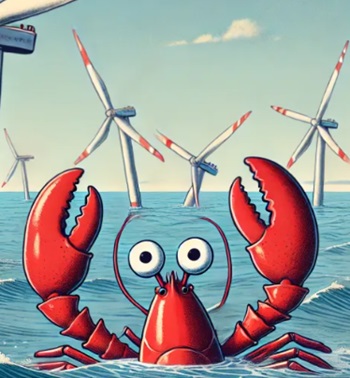 Last year, LD 1895 “An Act Regarding the Procurement of Energy from Offshore Wind Resources” passed, which got the ball rolling on Maine’s push for offshore wind port. The port will be the culmination of a more than decade-long taxpayer-funded effort to develop a floating offshore wind research array project, with the goal of eventually turning the Gulf of Maine into an industrialized wind farm. The viability of this technology was to be tested through an array of 12 wind turbines using the patented VolturnUS concrete, semi-submersible floating offshore wind turbine platform design created by Dr. Habib Dagher of the University of Maine, over the last decade. The Portland Press Herald conceded that this floating offshore wind research array project is too cost-prohibitive without an almost billion-dollar dedicated wind port facility off the coast of Maine, which means that a port must be constructed before the state can even move forward with the research array outlined in LD 1895. Enter Sears Island. more, >>CLICK TO READ<< 07:46
Last year, LD 1895 “An Act Regarding the Procurement of Energy from Offshore Wind Resources” passed, which got the ball rolling on Maine’s push for offshore wind port. The port will be the culmination of a more than decade-long taxpayer-funded effort to develop a floating offshore wind research array project, with the goal of eventually turning the Gulf of Maine into an industrialized wind farm. The viability of this technology was to be tested through an array of 12 wind turbines using the patented VolturnUS concrete, semi-submersible floating offshore wind turbine platform design created by Dr. Habib Dagher of the University of Maine, over the last decade. The Portland Press Herald conceded that this floating offshore wind research array project is too cost-prohibitive without an almost billion-dollar dedicated wind port facility off the coast of Maine, which means that a port must be constructed before the state can even move forward with the research array outlined in LD 1895. Enter Sears Island. more, >>CLICK TO READ<< 07:46
Seagull makes nest, lays eggs on Point Judith fisherman’s boat
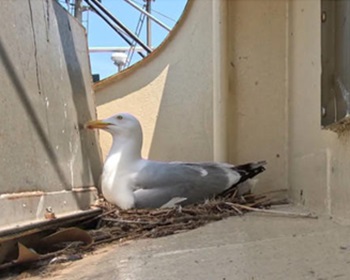 Since 2003, Paddy McGlade has been the captain of F/V Enterprise, his 70-foot-long stern dragger that he navigates while fishing in the ocean. “We catch Whiting, squid, fluke, everyday,” said McGlade. “We probably get up at 1 o’clock in the morning, leave at 2, and we’re back in at 1.” While they have lots of stories from out at sea, a new one has emerged. About two weeks ago McGlade noticed a nest on top of his boat near the cabin. “Paddy said, ‘There’s a seagull nest on the roof!’” said Shawn Overend, a crewmate. “We have been watching it ever since.” “The female usually flies off when we go fishing in the morning, and then when we come back at 12 during the day, she’ll land right on top of the boat and sit on the nest,” said McGlade. “Then when she is back another seagull, I think it’s the male usually flies over to the boat and hangs around like protection.” Photos, Video, more, >>CLICK TO READ<< 19:39
Since 2003, Paddy McGlade has been the captain of F/V Enterprise, his 70-foot-long stern dragger that he navigates while fishing in the ocean. “We catch Whiting, squid, fluke, everyday,” said McGlade. “We probably get up at 1 o’clock in the morning, leave at 2, and we’re back in at 1.” While they have lots of stories from out at sea, a new one has emerged. About two weeks ago McGlade noticed a nest on top of his boat near the cabin. “Paddy said, ‘There’s a seagull nest on the roof!’” said Shawn Overend, a crewmate. “We have been watching it ever since.” “The female usually flies off when we go fishing in the morning, and then when we come back at 12 during the day, she’ll land right on top of the boat and sit on the nest,” said McGlade. “Then when she is back another seagull, I think it’s the male usually flies over to the boat and hangs around like protection.” Photos, Video, more, >>CLICK TO READ<< 19:39
Former Lobsterman Thrives With Own Biz, G & C Marine Services
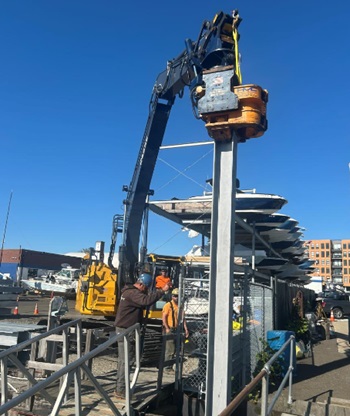 G & C Marine Services Inc., a full-service marine construction company located in Norwalk, Conn., is run by company founder Gary Wetmore and his son, Charlie, who have been in the business for approximately 20 years. In addition to the marine construction side of the business, which includes pile driving, masonry, maintenance and repair, dock building/carpentry and marine salvage, the company also owns a few small commercial fishing vessels targeting a few small commercial fishing vessels such as black sea bass. “Our marine service company has been very successful and that’s quite fortunate for me because it supports my fishing habit,” Gary said with a smile. Years ago, Gary was a lobsterman, however as water temperatures increased, the lobster population migrated north, leaving Gary looking for alternatives to support himself. He took a job working for a marine contractor in the Norwalk area. Photos, more, >>CLICK TO READ<< 15:18
G & C Marine Services Inc., a full-service marine construction company located in Norwalk, Conn., is run by company founder Gary Wetmore and his son, Charlie, who have been in the business for approximately 20 years. In addition to the marine construction side of the business, which includes pile driving, masonry, maintenance and repair, dock building/carpentry and marine salvage, the company also owns a few small commercial fishing vessels targeting a few small commercial fishing vessels such as black sea bass. “Our marine service company has been very successful and that’s quite fortunate for me because it supports my fishing habit,” Gary said with a smile. Years ago, Gary was a lobsterman, however as water temperatures increased, the lobster population migrated north, leaving Gary looking for alternatives to support himself. He took a job working for a marine contractor in the Norwalk area. Photos, more, >>CLICK TO READ<< 15:18
Lifting Up the Patron Saint of Netmakers, Shipbuilders, and Fishermen
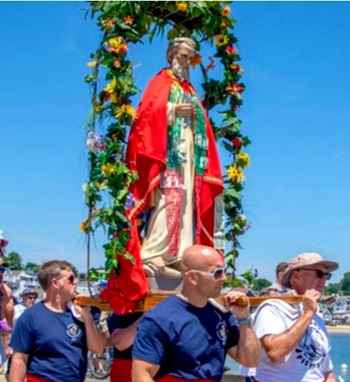 The 28th Provincetown Portuguese Festival begins Friday, June 28 with live music and dancing in Portuguese Square on Ryder Street. During the three-day-long celebration, Capt. Kenny Silva will lead a fishing derby on MacMillan Pier, fishermen will tell stories on Ryder Street where there will also be a crafts fair and poetry, and the Knights of Columbus will hold a soup tasting under a tent at the Bas Relief Park behind Provincetown Town Hall. But for at least some people, none of this will compare to the event happening for the 77th time, the Blessing of the Fleet at MacMillan Pier. “Everyone confuses the festival for the blessing,” says Provincetown fisherman Alex Brown. “The festival leads into the blessing, but the blessing is a separate event — it’s always the last Sunday of the month.” Photos, more, >>CLICK TO READ<< 13:14
The 28th Provincetown Portuguese Festival begins Friday, June 28 with live music and dancing in Portuguese Square on Ryder Street. During the three-day-long celebration, Capt. Kenny Silva will lead a fishing derby on MacMillan Pier, fishermen will tell stories on Ryder Street where there will also be a crafts fair and poetry, and the Knights of Columbus will hold a soup tasting under a tent at the Bas Relief Park behind Provincetown Town Hall. But for at least some people, none of this will compare to the event happening for the 77th time, the Blessing of the Fleet at MacMillan Pier. “Everyone confuses the festival for the blessing,” says Provincetown fisherman Alex Brown. “The festival leads into the blessing, but the blessing is a separate event — it’s always the last Sunday of the month.” Photos, more, >>CLICK TO READ<< 13:14
Increase to northern cod allocation ‘slap in the face’ to harvesters, FFAW president says
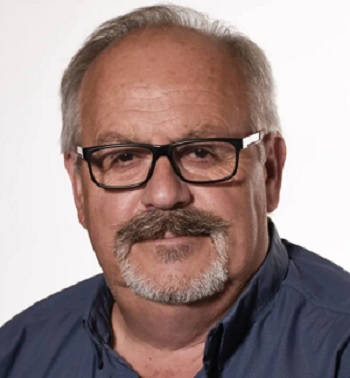 “It’s absolutely ridiculous. It’s probably the worst decision I’ve ever seen out of Ottawa, and I’ve seen some beauts,” said Pretty, who leads the Fish, Food and Allied Workers union. Federal Fisheries Minister Diane Lebouthillier on Wednesday announced an increase to the amount of total allowable catch (TAC) for northern cod in a fishing zone labelled Zone 2J3KL, which stretches from the southeast corner of Newfoundland to the Labrador coastline. Pretty said his largest concern is the fishery being switched from a designation of a stewardship fishery, which helped protect the stock, to a commercial fishery. He argues it brings private operators and harvesters from other countries back to the table too soon and involves parties that caused the moratorium in the first place. more, >>CLICK TO READ<< 08:06
“It’s absolutely ridiculous. It’s probably the worst decision I’ve ever seen out of Ottawa, and I’ve seen some beauts,” said Pretty, who leads the Fish, Food and Allied Workers union. Federal Fisheries Minister Diane Lebouthillier on Wednesday announced an increase to the amount of total allowable catch (TAC) for northern cod in a fishing zone labelled Zone 2J3KL, which stretches from the southeast corner of Newfoundland to the Labrador coastline. Pretty said his largest concern is the fishery being switched from a designation of a stewardship fishery, which helped protect the stock, to a commercial fishery. He argues it brings private operators and harvesters from other countries back to the table too soon and involves parties that caused the moratorium in the first place. more, >>CLICK TO READ<< 08:06
Salvage crews complete recovery of Aleutian Storm, and find a surprise
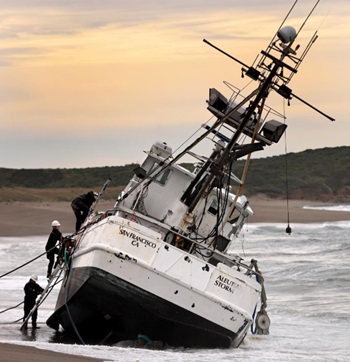 The last of the wreckage of the Aleutian Storm has been hauled away from south Salmon Creek Beach after final salvage operations that yielded a surprise about the boat’s construction that helps explain some of the challenges when it ran aground. An unusual, 4-inch thick and 4-foot-wide slab of steel that ran 36 feet along the bottom of the commercial fishing vessel’s keel may be the reason it was immovable after it grounded in the surf Feb. 9 south of Bodega Dunes Campground, a representative of Parker Diving Service said. “It anchored that vessel into the sand so when they were either trying to turn it and pull back to sea in those first couple of days and have a tug tow it, it kept snapping the line,” Nunn said. “I know the owner tried desperately to get it back to sea.” Photos, more, >>CLICK TO READ<< 06:31
The last of the wreckage of the Aleutian Storm has been hauled away from south Salmon Creek Beach after final salvage operations that yielded a surprise about the boat’s construction that helps explain some of the challenges when it ran aground. An unusual, 4-inch thick and 4-foot-wide slab of steel that ran 36 feet along the bottom of the commercial fishing vessel’s keel may be the reason it was immovable after it grounded in the surf Feb. 9 south of Bodega Dunes Campground, a representative of Parker Diving Service said. “It anchored that vessel into the sand so when they were either trying to turn it and pull back to sea in those first couple of days and have a tug tow it, it kept snapping the line,” Nunn said. “I know the owner tried desperately to get it back to sea.” Photos, more, >>CLICK TO READ<< 06:31
‘Dark day for fishery’; inshore advocates say lifting 32-year northern cod moratorium wrong way forward
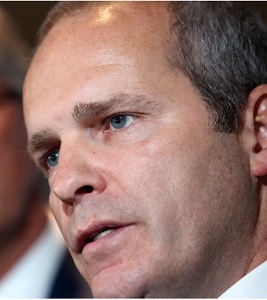 DFO’s decision to lift the northern cod moratorium and unleash foreign and domestic offshore draggers on the iconic stock when all signs point to proceeding with extreme caution amounts to a dark day for the province’s commercial fisheries. “We have learned nothing after 32 years of moratorium,” says inshore advocate Ryan Cleary. “The only thing historic about today is the relentless fisheries management failure.” Released unexpectedly Wednesday morning, DFO’s 2024 northern cod management plan reestablishes a commercial fishery for northern cod, the first since 1992, setting the total allowable catch (TAC) at 18,000 tonnes. That’s only a 5,000-tonne increase from 2023’s maximum harvest level of 12,999 tonnes, but that was under a small-scale stewardship fishery limited to inshore handlines, longlines, gillnets, and cod pots. more, >>CLICK TO READ<< 13:04
DFO’s decision to lift the northern cod moratorium and unleash foreign and domestic offshore draggers on the iconic stock when all signs point to proceeding with extreme caution amounts to a dark day for the province’s commercial fisheries. “We have learned nothing after 32 years of moratorium,” says inshore advocate Ryan Cleary. “The only thing historic about today is the relentless fisheries management failure.” Released unexpectedly Wednesday morning, DFO’s 2024 northern cod management plan reestablishes a commercial fishery for northern cod, the first since 1992, setting the total allowable catch (TAC) at 18,000 tonnes. That’s only a 5,000-tonne increase from 2023’s maximum harvest level of 12,999 tonnes, but that was under a small-scale stewardship fishery limited to inshore handlines, longlines, gillnets, and cod pots. more, >>CLICK TO READ<< 13:04
Lobster boats race in rain and fog in Bass Harbor
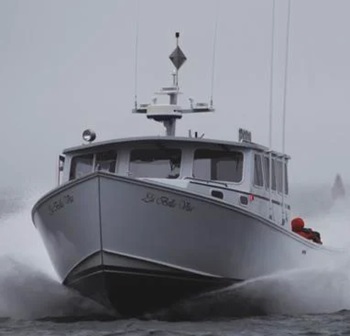
This year the big winner was Jeff Eaton’s La Bella Vita. The Northern Bay 38-foot, 815 horsepower vessel took first in its class and then topped the most competitive races of the day, Jon Johansen photos.
Drizzle, downpours and at times dense fog delayed but did not stop the roar of gas- and diesel-powered lobster boats racing through the harbor when the Maine Lobster Boat Races touched down in Bass Harbor on June 23. “It was an exciting day!” Race Committee Chairperson Elean Mitchell said, despite the cold, wet weather. “We handed out prizes during off-and-on downpours.” Douglas Cornman performed the blessing of the fleet at 9:45 a.m., with the first race starting around 10:30, Mitchell said. The 31st and final race finished just after noon. across the 31 races, with winners receiving $200 in prize money. Lobstermen race for bragging rights as much as prizes. The Maine Lobster Boat Races next land in Moosabec Reach in Jonesport on June 29 and Stonington on July 14. 7Photos, results, more, >>CLIC TO READ<< 10:35

End of cod moratorium touted after 32 years as Ottawa approves small increase in commercial catch
Thirty-two years after the federal government announced a moratorium that shut down Newfoundland and Labrador’s cod industry, Fisheries Minister Diane Lebouthillier said Wednesday that it is reopening. But what the federal government described in a statement as the “historic return of the commercial northern cod fishery” will amount to just a small increase in fishing activity that had been allowed during the recent years of the moratorium. “Ending the northern cod moratorium is a historic milestone for Newfoundlanders and Labradorians,” Lebouthillier said in a statement. “We will cautiously but optimistically build back this fishery with the prime beneficiaries being coastal and Indigenous communities throughout Newfoundland and Labrador.” The Fisheries and Oceans announcement comes with political overtones. Video, more, >>CLICK TO READ<< 09:40
A fishing conglomerate created a fake company to facilitate a merger. It could now be on the hook for billions of dollars.
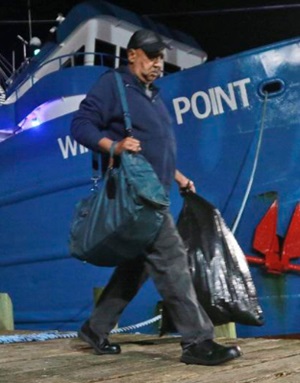 Commercial fishers are one of the professions that’s been nickeled-and-dimed in recent decades, right up there with long-haul truckers and chicken farmers. In New Bedford, Massachusetts, the most lucrative port for seafood catches in the country, a fisherman profiled by ProPublica in 2022 was forced to contract with one of the world’s seafood powerhouses, Blue Harvest, because it had become the only buyer in the local market. Per the contract, fishers have to lease fishing permits from the company; the costs for vessel maintenance, fuel, gear, and repairs on company-owned boats are taken out from fishers’ own paychecks, called settlement sheets. After fishing around the clock for ten days to meet quotas, Jerry Leeman only made 14 cents on the pound and his crew 7 cents, even as their haddock catch sold for $2.28 per pound at market. Blue Harvest took the lion’s share of earnings, while placing all the risks of the trade onto fishers. “Tell me how I can catch 50,000 pounds of fish yet I don’t know what my kids are going to have for dinner,” more, >>CLICK TO READ<< 07:59
Commercial fishers are one of the professions that’s been nickeled-and-dimed in recent decades, right up there with long-haul truckers and chicken farmers. In New Bedford, Massachusetts, the most lucrative port for seafood catches in the country, a fisherman profiled by ProPublica in 2022 was forced to contract with one of the world’s seafood powerhouses, Blue Harvest, because it had become the only buyer in the local market. Per the contract, fishers have to lease fishing permits from the company; the costs for vessel maintenance, fuel, gear, and repairs on company-owned boats are taken out from fishers’ own paychecks, called settlement sheets. After fishing around the clock for ten days to meet quotas, Jerry Leeman only made 14 cents on the pound and his crew 7 cents, even as their haddock catch sold for $2.28 per pound at market. Blue Harvest took the lion’s share of earnings, while placing all the risks of the trade onto fishers. “Tell me how I can catch 50,000 pounds of fish yet I don’t know what my kids are going to have for dinner,” more, >>CLICK TO READ<< 07:59
Athearn Marine Agency Boat of the Week: 39′ x 15.5 Novi Lobster/ Gillnetter, 375HP, John Deere 8.1 Diesel
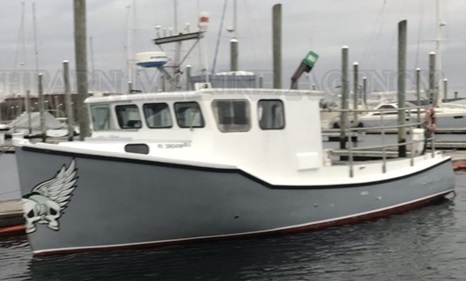 To review specifications, information, and 30 photos’, >click here< To see all the boats in this series, >click here< 06:59
To review specifications, information, and 30 photos’, >click here< To see all the boats in this series, >click here< 06:59
Petersburg seiner overturns in Anita Bay; one crew member injured
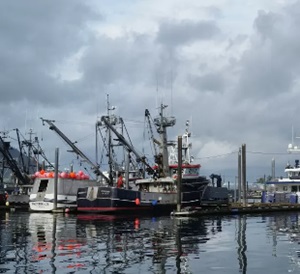 A Petersburg seiner overturned just south of Wrangell in Anita Bay at about 10 a.m. this morning. Multiple entities responded – the U.S. Coast Guard, U.S. Forest Service, and Wrangell Search and Rescue helped evacuate all five crewmembers aboard the 58-foot F/V Pamela Rae. The crew made it out unharmed, except for one person who sustained a minor injury. Lieutenant Matt Naylor, a spokesperson for the U.S. Coast Guard, said they don’t know what caused the Pamela Rae to overturn, but it could have been a mechanical problem. more, >>CLICK TO READ<< 06:05
A Petersburg seiner overturned just south of Wrangell in Anita Bay at about 10 a.m. this morning. Multiple entities responded – the U.S. Coast Guard, U.S. Forest Service, and Wrangell Search and Rescue helped evacuate all five crewmembers aboard the 58-foot F/V Pamela Rae. The crew made it out unharmed, except for one person who sustained a minor injury. Lieutenant Matt Naylor, a spokesperson for the U.S. Coast Guard, said they don’t know what caused the Pamela Rae to overturn, but it could have been a mechanical problem. more, >>CLICK TO READ<< 06:05
Jake Anderson’s Struggles With the Saga on ‘Deadliest Catch,’ Explained
 For 19 years, Deadliest Catch viewers have gotten a firsthand glimpse into some of the deadliest ocean waves surrounding the U.S. Crabbers and fishermen are the stars of this series, a few of whom have been there since day one of the show. Captain Sig Hansen has been the primary captain featured in this series, and he has mentored several others who have since become captains of their own boats. One of those captains and former mentees is Jake Anderson, who is presently dealing with big issues. In 2015 with his lifesavings, he invested in the Saga as his new boat with another co-owner. Unfortunately, thanks to some financial problems his partner allegedly caused, Jake Anderson lost the Saga. Photos, more, >>CLICK TO READ<< 16:17
For 19 years, Deadliest Catch viewers have gotten a firsthand glimpse into some of the deadliest ocean waves surrounding the U.S. Crabbers and fishermen are the stars of this series, a few of whom have been there since day one of the show. Captain Sig Hansen has been the primary captain featured in this series, and he has mentored several others who have since become captains of their own boats. One of those captains and former mentees is Jake Anderson, who is presently dealing with big issues. In 2015 with his lifesavings, he invested in the Saga as his new boat with another co-owner. Unfortunately, thanks to some financial problems his partner allegedly caused, Jake Anderson lost the Saga. Photos, more, >>CLICK TO READ<< 16:17
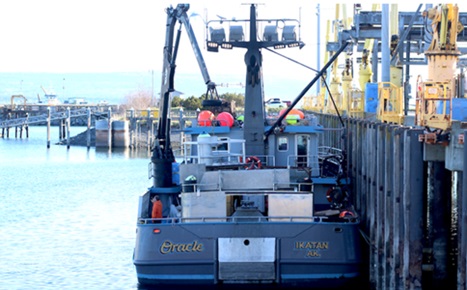
As salmon season kicks off, some Alaska fishermen fear for their futures
On a brilliant spring morning, Buck Laukitis, a longtime fisherman from this Kenai Peninsula town, stood at the city dock watching his catch come ashore. Crew members aboard Laukitis’ boat, the Oracle, filled bags with dozens of halibut — some of the fatter ones worth $200 or more — which a crane would lift up to the dock. There, processing workers on a small slime line weighed the fish, tossed crushed ice into the gills and slid them into boxes for shipment to Canada. Harvest, unload, sell, repeat — exactly how the iconic Alaska commercial fishing industry is supposed to work. Until you ask Laukitis about the Oracle’s sister vessel, the Halcyon. Instead of fishing for another species, black cod, like it’s built for, the Halcyon is tied up at the dock. For Laukitis to make money, processing companies would need to pay $2.50 for each pound of black cod delivered to a plant. But right now, buyers aren’t paying much more than $1.50, he said. With Laukitis on the dock last month were his young grandkids and adult daughters — fishermen who run a popular brand called the Salmon Sisters. Photos, more, >>CLICK TO READ<< 12:40






